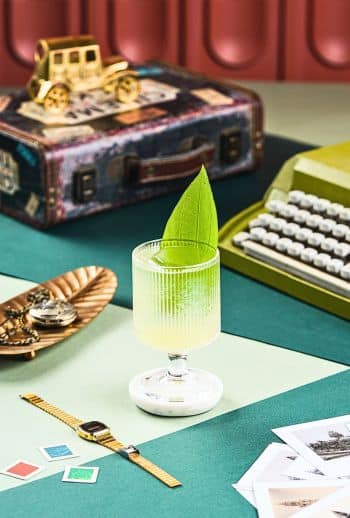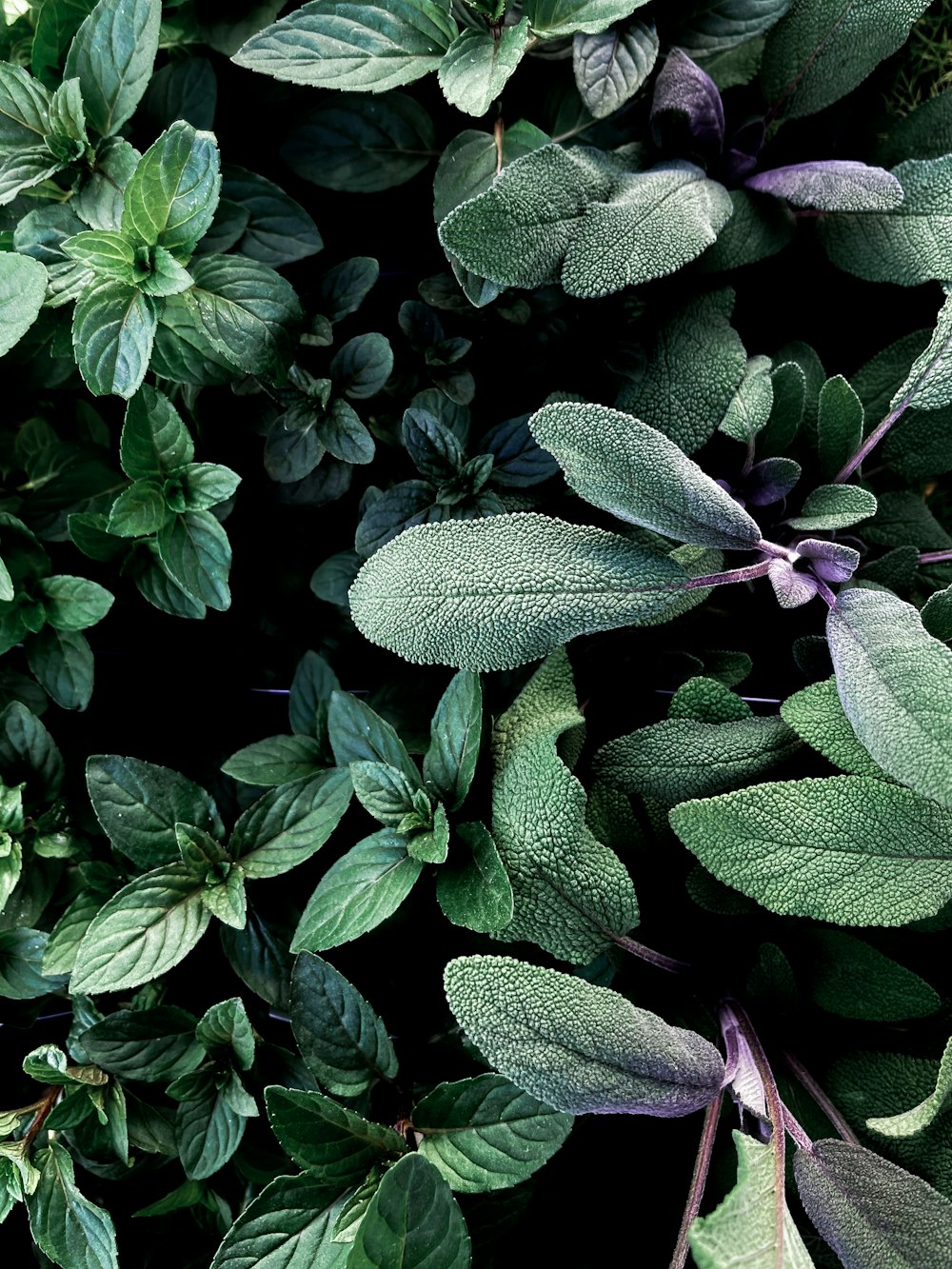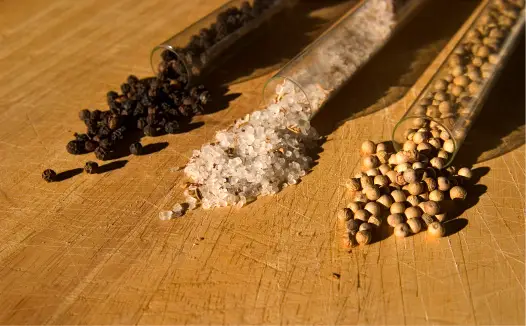Contrary to popular belief, mocktails don’t have to be a poor substitute for regular alcoholic drinks. In fact, they can be just as delicious, refreshing, and enjoyable as traditional cocktails. Plus, they’ll never give you a hangover. So, if you’re curious about alcohol-free cocktail recipes, keep reading. We’ve created a list of the best herbs for infusing in mocktails and some simple recipes for taking your mixology to the next level.
What Are The Best Herbs To Infuse Your Mocktails With?
When it comes to mixology, herbs are an essential element. Providing color, freshness, and complex botanical flavor, herbs can transform even the most mundane of mocktails into a sensational, tasty drink. However, not all herbs are equal. To make a truly great mocktail, you need to familiarize yourself with a range of mixology-friendly herbs that can bring out the best in your other ingredients.
Basil
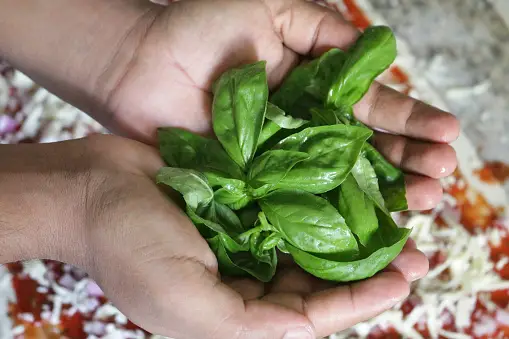
Basil makes a great addition to any cold beverage, alcoholic or not. Deeply fragrant with notes of black pepper, infusing your drinks with this herb will add a balance of both savory and sweet. It pairs exceptionally well with citrus fruits, and if you’re feeling very adventurous, tomato!
Mint
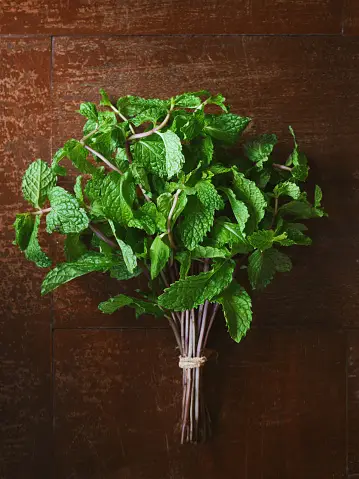
Mint is refreshing, zingy, and leaves a cooling effect on your mouth. There are three different types of mint to note when mixing drinks:
- Peppermint – The most classic kind of mint, mild but still cooling, with a slightly rough textured leaf. Perfect as a garnish as well as an infusion.
- Spearmint – Spearmint is the mintiest kind of mint around, and it’s usually what’s used in mojitos. Its leaves are softer and smaller, and it delivers a powerful mint flavor not unlike toothpaste.
- Garden mint – Garden mint is the mildest mint variety of the three, with a gentle peppermint undertone and broad, rough, dark green leaves.
All mint varieties are popular flavor accompaniments to lemon and other citrus fruits. This is because it likes to be paired with acidity. Tart fruits like plum, pineapple, and apricot also work well together.
Rosemary
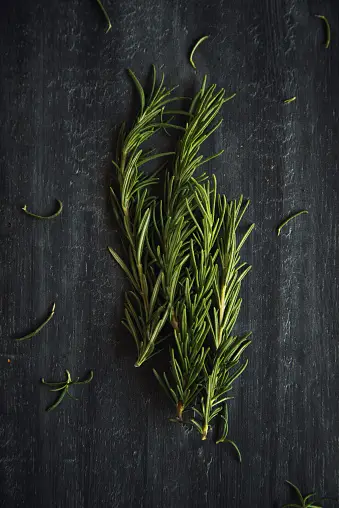
A very aromatic, spikey, dark green herb that has a complex flavor profile, Rosemary has a woody, sage-like, and very subtle minty flavor palette with a slightly bitter aftertaste. For its gentle bitterness, rosemary pairs very well in drinks with punchy flavors like grapefruit and other bitter rinds or zests.
Thyme
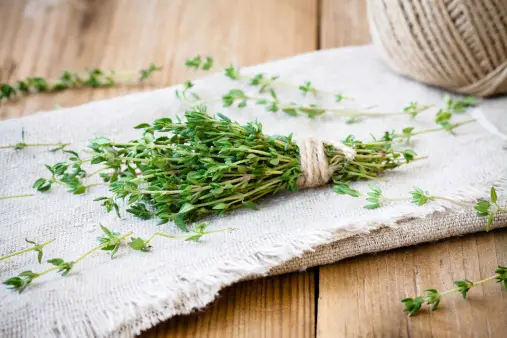
Thyme is a soft, sweet, small-leaved herb with distinctive floral notes. Like many of these herbs, it often comes up in savory dishes, but with the right fruits and spices, it can bring any mocktail to life. Thyme pairs beautifully with soft, sweet fruits like strawberry and pear, while ginger root brings out its more complex undertones.
Lavender

Known for its soothing properties and sublime sweet fragrance, lavender’s floral notes make it a superb addition to both sweet and tart mocktails. It’s great for summery-style drinks and pairs perfectly with citrus flavors as well as strawberries, blueberries, apples, and pears. It also complements other herbs such as Rosemary, sage, and thyme, making it a very versatile addition to any drink.
Sage
One of the most underutilized herbs for cocktail and mocktail infusions, sage, is also one of the most complex. This herb tends to elicit earthy flavors of eucalyptus, mint, black pepper, and lemon. Because of its mild, almost ethereal flavor, sage pairs well with bright, sweet, and tart flavors like that of fresh pineapple, dragon fruit, or cherry.
Cloves
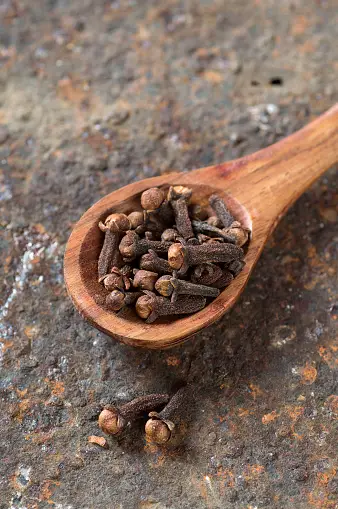
Not only are cloves packed full of antioxidants, they’re tasty too. This intensely aromatic spice is both subtly sweet and somewhat bitter, bringing its own powerful warmth to any drink. Cherry and clove complement each other perfectly as the bitterness and sweetness counterbalance one another, as do apple and orange. However, this is a spice to use in moderation, as it can be very overpowering.
Lemon Balm

The lesser-known lemon balm looks almost identical to mint but instead has a bright, citrusy flavor and aromatic profile that sets it apart from others on this list. You can use lemon balm to enhance already citrusy flavors or complement it with something soft and gentle, like lychee or pear.
Dhania
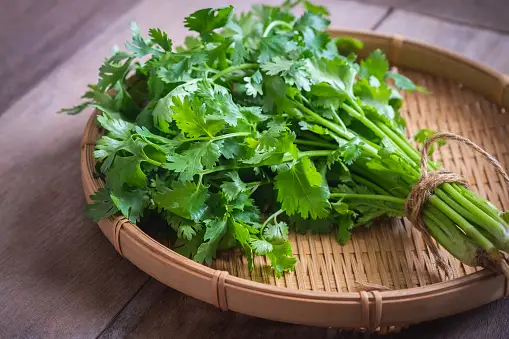
A herb that people either love or hate, dhania has a bold flavor that dominates drinks. If you’re using a dhania infusion, pair it with equally bold flavors like zingy ginger, jalapeno, or orange to enhance its powerful notes and memorable taste.
Cardamom
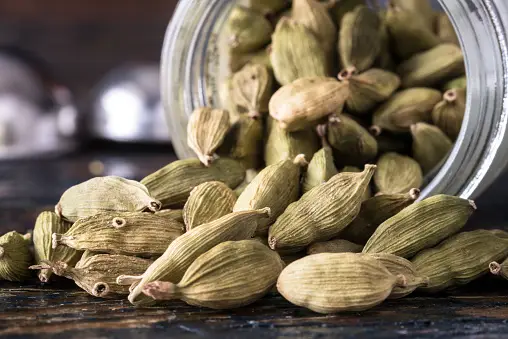
With its distinctive flavor that’s peppery and floral with a touch of citrus, cardamom is another bold herb that can enhance any mocktail. The big seeds are ideal for infusing and can be removed before serving using a cocktail strainer. Cardamom pairs well with ginger, citrus fruits, and cranberry, as well as carrot and tomato juice, for something really different!
Star Anise
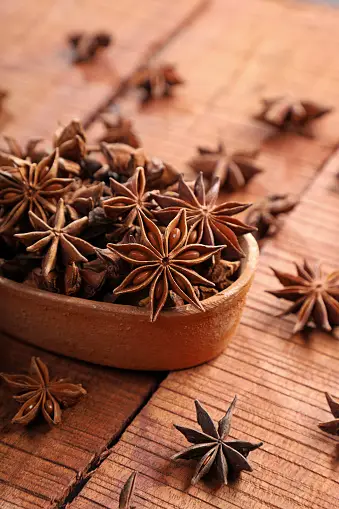
On its own, star anise has a sweet, licorice-like taste that can liven up any drink or dish. However, when added to mocktails, it adds a bit of aniseed-like warmth. This versatile herb’s seeds and stars are packed full of flavor and go well with orange, grapefruit, and cranberry, or simply infused in a syrup and added to sparkling water or soda water.
Peppers
Pink and black peppercorns, bell peppers, and even chili peppers are all fabulous flavors to add to mocktails. While not strictly herbs, they certainly introduce a bit of heat. If you want to step up your mixology game, try pairing pink or black peppercorns with strawberry so that every sip is enhanced not just by the flavor but by a whiff of peppery goodness too. You can also mix bell peppers with basil and jalapenos with ginger ale or pineapple to add a touch of sweet and spicy.
How Do You Make A Herb Infusion?
Typically, you’d either muddle the herbs with the spirit of choice or leave the stalks to sit in a sealed spirit bottle for a set period of time. But if you are making mocktails, you can simply swap out the alcohol for a non-alcoholic liquid or syrup or muddle your herbs with a mixer to draw out the flavors. You can also use herbs as elegant mocktail garnishes. You can get creative by dehydrating and crushing them, turning them into a syrup, or simply adding a few fresh leaves for some eye-catching green touches.
10 Refreshing Mocktail Recipes
Whether you’re on your way to becoming a qualified bartender, own a bar or restaurant, or simply want to enhance your skills in this alternative mixology genre, inspiration is always a good idea. Take a look at these flavor combinations for ideas about how to mix, match, and pair up your herbs with complementary fruits and mixers.
- Cucumber, mint, club soda, and lemon rind
- Blueberry, basil, and tonic water
- Lime, strawberry, rosemary, and ginger ale
- Lemon balm and lavender with honey and club soda
- Mint, lemon, lime, and lemonade
- Dhania, ginger, lemonade, and orange juice
- Cardamom, lime, and cranberry juice
- Sage, black pepper, and pineapple juice
- Rosemary, grapefruit juice, and tonic water
- Basil, orange, and tomato juice with a twist of black pepper
There’s an endless list of varieties for mocktail mixology combinations, and trying them out is half the fun.
Make Mocktail Magic With Infused Herbal Drinks
Some might say that alcohol is a necessary element of a good cocktail, but we beg to differ. A great drink simply needs fresh ingredients, well-balanced flavors, and a willingness to get creative behind the bar. With the right combination of herbs and spices, you can elevate your mocktail game to new heights.
Ida Ohlsson
Freelance editor, gamer, cat mommy, and self-care advocate, Ida Ohlsson enjoys simple pleasantries in life like an afternoon stroll or sipping morning tea while reading her favorite book. She takes pleasure in reading and writing topics that promote wellness and a healthy lifestyle.
